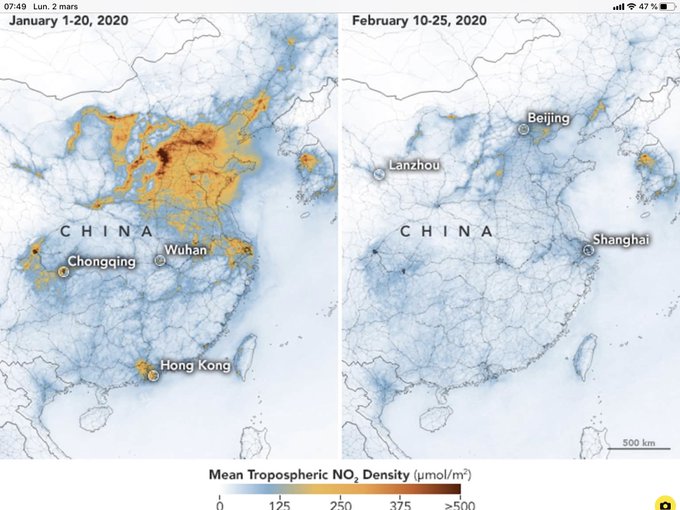William Davies: The last global crisis didn't change the world. But this one could // Bram Ieven & Jan Overwijk - We created this beast
It is now inevitable that we will experience deep
global recession, a breakdown of labour markets and the evaporation of
consumer spending. The terror that drove government action in the autumn of
2008 was that money would stop coming out of the cash machines, unless the
banking system was propped up. It turns out that if people stop coming out of
their homes, then the circulation of money grinds to a halt as well.
Small businesses are shedding employees at a frightening speed, while Amazon has
advertised for an additional 100,000 workers in the US. (One of the few, and far from welcome, continuities from the world we’re leaving behind is the relentless growth of the platform giants.) The decade that shapes our contemporary imagination of crises is the 1970s, which exemplified the way a historic rupture can set an economy and a society on a new path. This period marked the collapse of the postwar system of fixed exchange rates, capital controls and wage policies, which were perceived to have led to uncontrollable inflation.
Small businesses are shedding employees at a frightening speed, while Amazon has
advertised for an additional 100,000 workers in the US. (One of the few, and far from welcome, continuities from the world we’re leaving behind is the relentless growth of the platform giants.) The decade that shapes our contemporary imagination of crises is the 1970s, which exemplified the way a historic rupture can set an economy and a society on a new path. This period marked the collapse of the postwar system of fixed exchange rates, capital controls and wage policies, which were perceived to have led to uncontrollable inflation.
It also created the conditions in which the new right of Margaret
Thatcher and Ronald Reagan could ride to the rescue, offering a novel medicine
of tax cuts, interest rate hikes and attacks on organised labour.
The 1970s inspired a vision of crisis as a wide-ranging shift in ideology, which has retained its hold over much of the left ever since. The crisis involved a contradiction that was largely internal to the Keynesian model of capitalism (wages were being pushed up faster than productivity growth, and destroying profits), and an overhaul in the dominant style of business: out with rigid heavy manufacturing, in with flexible production that could respond more nimbly to consumer tastes....
https://www.theguardian.com/commentisfree/2020/mar/24/coronavirus-crisis-change-world-financial-global-capitalismThe 1970s inspired a vision of crisis as a wide-ranging shift in ideology, which has retained its hold over much of the left ever since. The crisis involved a contradiction that was largely internal to the Keynesian model of capitalism (wages were being pushed up faster than productivity growth, and destroying profits), and an overhaul in the dominant style of business: out with rigid heavy manufacturing, in with flexible production that could respond more nimbly to consumer tastes....
Bram Ieven & Jan Overwijk - The political ecology of COVID-19
There is nothing ‘natural’ about the
coronavirus pandemic: global capitalism has created it. Containment measures of
social distancing bear the characteristics of a general strike. It can serve as
an experiment taking back control over our own time

Two areal maps of
China. The map on the left, from early January 2020, shows how orange-coloured
nitrogen clouds extend over the entire country. On the map on the right, from a
month and a half later, those same clouds have disappeared. What happened? It was French
philosopher Bruno Latour who shared these satellite images in a tweet, pointing out that a virus was able to achieve
political measures that the Chinese state had always believed to be impossible.
For the map on the right shows China after its intensive internal traffic came
to a halt, just a few weeks after the quarantine was put in place to contain
the COVID-19 pandemic.
Bruno Latour has been
advocating a reconceptualization of how we think about modern politics for
decades. Instead of thinking of our political order as clearly distinct from
nature, in We have never been modern (1993) Latour suggests
that the political is always interwoven with the natural order from which it
claims to distinguish itself. The COVID-19 pandemic proves his point once
again. However one imagines how nature and culture are interconnected, it is
clear that ecological agents have a powerful bearing on society. The COVID-19
pandemic forces us to push this idea even further: it is time to face the fact
that our political system itself has played a major role in producing this new
ecological actor. We are the ones creating this so-called monster.... read more:
https://www.eurozine.com/we-created-this-beast/see also
Robert Reich: America has no real public health system – coronavirus has a clear run // America Is a Sham
